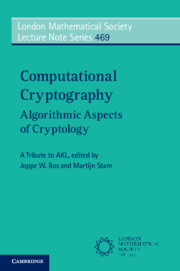Book contents
- Frontmatter
- Contents
- List of Contributors
- Preface
- 1 Introduction
- Part I Cryptanalysis
- 2 Lattice Attacks on NTRU and LWE: A History of Refinements
- 3 History of Integer Factorisation
- 4 Lattice-Based Integer Factorisation: An Introduction to Coppersmith’s Method
- 5 Computing Discrete Logarithms
- 6 RSA, DH and DSA in the Wild
- 7 A Survey of Chosen-Prefix Collision Attacks
- Part II Implementations
- References
- Index
5 - Computing Discrete Logarithms
from Part I - Cryptanalysis
Published online by Cambridge University Press: 11 November 2021
- Frontmatter
- Contents
- List of Contributors
- Preface
- 1 Introduction
- Part I Cryptanalysis
- 2 Lattice Attacks on NTRU and LWE: A History of Refinements
- 3 History of Integer Factorisation
- 4 Lattice-Based Integer Factorisation: An Introduction to Coppersmith’s Method
- 5 Computing Discrete Logarithms
- 6 RSA, DH and DSA in the Wild
- 7 A Survey of Chosen-Prefix Collision Attacks
- Part II Implementations
- References
- Index
Summary
In Chapter 5, Computing Discrete Logarithms, Robert Granger and Antoine Joux discuss the question “how hard is it to compute discrete logarithms in various groups?”. It details the key ideas and constructions behind the most efficient algorithms for solving the discrete logarithm problem (DLP) with a focus on the recent advances related to finite fields of extension degree >1. A highlight is the rapid development, in the period 2012–2014, of quasi-polynomial time algorithms to solve the DLP in finite fields of fixed charaterstic. Both Granger and Joux contributed significantly to this development, albeit on competing teams. For this book, in Chapter 5, they join forces and explain how different ideas eventually led to the fall of the fixed characteristic finite-field discrete logarithm problem.
Information
- Type
- Chapter
- Information
- Computational CryptographyAlgorithmic Aspects of Cryptology, pp. 106 - 139Publisher: Cambridge University PressPrint publication year: 2021
Accessibility standard: Unknown
Why this information is here
This section outlines the accessibility features of this content - including support for screen readers, full keyboard navigation and high-contrast display options. This may not be relevant for you.Accessibility Information
- 1
- Cited by
